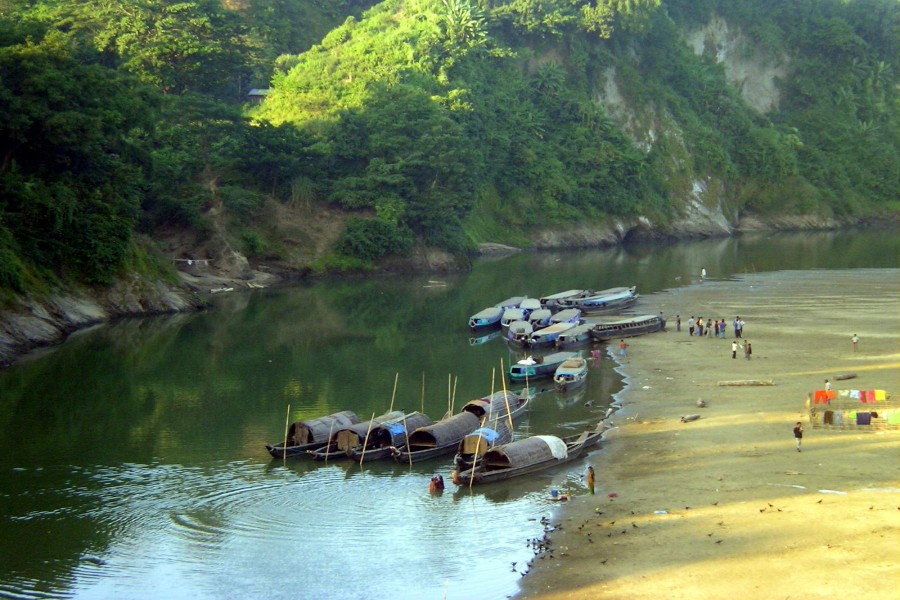While tourism and travel generates 10 per cent of world gross domestic product (GDP), it generates only 2.1 per cent of GDP for Bangladesh, says United Nations World Tourism Organisation (UNWTO) statistics. This demonstrates that the country is lagging far behind most of the countries of the world in tourism sector.
The civil aviation and tourism minister, in a recent observation, said the tourism industry needs more investments and he will request the government to allocate more fund for further development of the sector. He claimed that Bangladesh tourism industry was advancing for various initiatives taken up by the present government.
Last year, the government undertook a plan to increase the number of foreign tourists by 70 per cent to 1.0 million through a series of promotional activities. It is not yet known whether the plan ended in a success or not.
There is no denying that the country has immense potential to attract travellers, due to its rich cultural heritage and famous tourist spots, such as Cox's Bazar and the Sundarbans. The Tour Operators Association of Bangladesh (TOAB) has, in a recent proposal, urged the authorities concerned to constitute a special taskforce to support the industry.
In the proposal, TOAB urged the government to make foreign missions and embassies active in the tourist generating countries by disseminating positive messages about Bangladesh to restore the confidence of the tourists.
Many countries such as Singapore, Indonesia, France, Belgium and Sri Lanka pursued similar activities after suffering many setbacks. They made it possible to propagate positive messages around the world saying that terrorism is a global crisis and tight security measures are in place for the tourists which brought back the confidence of the tourists.
Bangladesh should do the same to recover losses it has suffered due to terror attacks. In fact, sustained demand for tourism, coupled with the industry's ability to stay resilient in the face of shocks, continues to underline its great significance and value as a key sector for economic development.
There is no denying that the tourism industry is well-known as a complete provider of services including transportation, accommodation, food, entertainment and hospitality services for the tourists. All these activities can enhance the economic development process by creating jobs, developing infrastructure and entrepreneurial skills, improving balance of payments, earning foreign exchange and export revenues.
Bangladesh, being located at the connecting point of South and South East Asian countries, is home to the longest unbroken natural sea beach in Cox's Bazar and Sundarbans, the biggest mangrove forest in the world. The country has bountiful resources to offer to both local and foreign travellers with its scenic beauty, ethnic diversity, unique cuisine, rich heritage and historical sites, profound religious sentiments and much more.
Bangladesh Economic Zones Authority (BEZA) is reported to have been setting up three tourism parks at Cox's Bazar district with a target to create 0.2 million employments. Every year, the parks are likely to create opportunities for additional two billion dollar economic activities.
The three tourism parks are Sabrang Tourism Park, Naf Tourism Park (Jaliardwip) and Sonadia Eco Tourism Park. Through the development of tourism parks, BEZA thinks that Bangladesh would improve its travel and tourism competitiveness ranking.
The first tourism park is being set up on about 1,027 acres of land at Sabrang, which will generate employment opportunities for about 25,000 people. It will be the first of its kind in Bangladesh and help attract not only tourists, but also investment from both home and abroad.
Ocean-park, golf course, hotels and resorts, duty-free shopping mall, food courts, souvenir shops, hospital, theatres, helipad, business centres, 3D aquarium and prayer hall are being set up in the zone. Tourists will also be able to take part in surfing, bungee jumping, buggy car driving, scuba diving and hang gliding.
There are numerous reasons that stand as hindrance to the development of the tourism sector in Bangladesh. Truly, the basic infrastructure of the country has not been developed as yet. The cities and towns of the country lack adequate number of good quality accommodation facilities, decent public transports, safe and secured roads, well-equipped hospitals, and access to clean water, hygienic foods and an uninterrupted access to electricity.
In the circumstances, there is the need for strengthening efforts by the government to overcome the barriers in tourism sector. It must be developed true to its potential.


